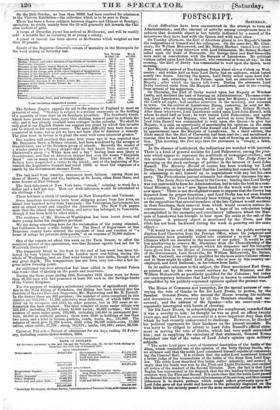POSTSCRIPT.
SATURDAY.
Great difficulties have been encountered in the attempt to form a Administration ; and the amount of activity among conspicuous men to achieve that desirable object is but faintly indicated by a record of the interviews they have had with the Queen and with each other. On Tuesday afternoon, the Earl of Aberdeen placed in her Majesty's hands the resignations of himself and his colleagues. On the same day, Mr. Glad- stone, Sir William Molesworth, and Mr. Sidney Herbert. visited Lord Aber- deen ; and, after a long interview with Lord Palmerston, Mr. Sidney Herbert called upon the Duke of Newcastle. Sir George Grey and Earl Granville were next in consultation with the Marquis of Lansdowne. No political visitors called upon Lord John Russell, who remained at home all day. In the evening, the Earl of Derby was commanded to wait upon the Queen next morning.
Her -Majesty arrived at Buckingham Palace about eleven o'clock on Wed-
nesday ; and within half an hour Lord Derby had an audience, which lasted nearly two hours. Leaving the Queen, Lord Derby called upon Lord Pal- merston ; and, returning to the Palace, again had an interview with her Majesty ; after which the Queen left town. During the afternoon Lord Derby received visits from the Marquis of Lansdowne, and .in the evening from several of his supporters.
On Thursday, the Earl of Derby waited upon her Majesty at Windsor Castle, and declined the task of forming an Administration. The seine even ing, iord Lansdowne, by command, waited upon her Majesty; remained at the Castle all night ; had another interview in the morning, and returned to town. On his arrival at Lansdowne House, yesterday, he sent for Mr. Gladstone; who on departing proceeded to call upon Mr. Sidney Herbert. After these interviews, Lord Lansdowne called upon Lord John Russell, with whom he staid half an hour ; be next visited Lord Palmerston ; and again had an audience of her Majesty, who had arrived in town from Windsor. Lord John Russell was commanded to wait upon the Queen—to give her Majesty, it is said, an opportunity of ascertaining his opinions on the state of parties. In the evening, Lord John Russell and Lord Palmerston waited by appointment upon the Marquis of Lansdowne. In a third edition, the Globe stated that the Earl of Clarendon had been sent for ; and mentioned ir rumour that he had been intrusted with the task of forming an Administra. lion. This morning, the Post says that the statement is "simply, a falai, cation."
In the absence of settlement, the indications are watched with interest-
There is a kind of general acclaim for Lord Palmerston, among the jour- nals which appear to represent the multitude of newspaper-readers; and this acclaim is concentrated in the Morning Post. The Daily News is operating on the stock exchange of politics in the interest of Lord John. Russell. The Morning Herald of course has been working for Lord. Derby ; but yesterday it admitted that his Lordship had committed a fault. in consenting to mix himself up in negotiations with any but his own. party. The Protectionist journal solemnly but obscurely discusses his mo- tives. The Daily News traces these to the Crown ; hinting that Lord Derby' was not instructed to form his Administration, but to take the lead in a com- bined Ministry, to be a" new figure-head for the wreck with one or two new spars." There is not the slightest reason to suppose that the Crown has departed from its proper functions ; and Lord Derby has not even hinted a complaint. The Times had already been writing as early as Wednesday on the supposition that several members of the late Cabinet would oontinue in their functions, their removal from which would occasion serious in- convenience. Today that journal sees a hope of its calculation being accomplished in the energetic and conciliatory influence which the Mar- quis of Lansdowne has brought to bear upon the crisis at the tall of the Sovereign. A primary object_ is mentioned by the Times, and the Globe has not been backward during the week in pointing out the same- object—
It would be an evil of the utmost consequence to the public servieeto
displace Lord Clarendon from the Foreign Office, where his judgment and perseverance have gradually called into existence a system of foreign alliances which are essential to the success of our policy. It would be not less mischievous to remove Mr. Gladstone from the Chancellorship of the Exchequer, and from the position which his eloquence and his integrity! have given him in the House of Commons. Among the younger members of the Government, Lord Granville, Sir William Moleswortb, Mr. Baines,. and Mr. Cardwell, are evidently qualified for themore active Cabinet offices; and to these might be added Lord Elgin, who is now in this country un- employed, and Lord Dalhousie, on his return from India."
In its earlier reference to the subject, the Times mentioned Earl Grey; as pointed out by his own recent services for War Minister, and Sir William Molesworth as peculiarly qualified for the Colonies ; but tedsya our contemporary intimates that Lord Grey is known to consider hrimself disqualified by his publicly-expressed opinions against the present war.


























 Previous page
Previous page